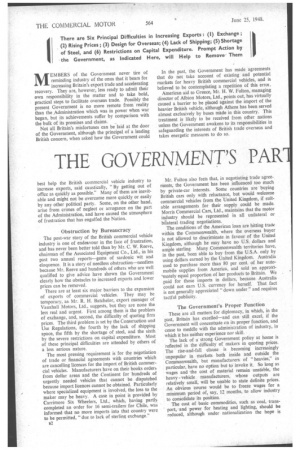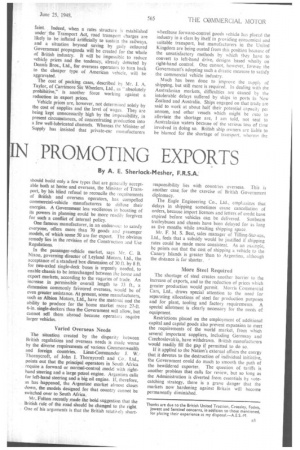THE GOVERNMENT'S PAR IN PROMOTING EXPORTS
Page 36

Page 37

If you've noticed an error in this article please click here to report it so we can fix it.
best help the British commercial vehicle industry to increase exports, said caustically, "By getting out of office as quickly as possible." Many of them are inevitable and might not be overcome more quickly or easily by any other political party. Some, on the other hand, arise from crimes of neglect or arrogance on the part of the Administration, and have caused the atmosphere of frustration that has engulfed the Nation.
Obstruction by Bureaucracy The post-war story of the British commercial vehicle industry is one of endeavour in the face of frustration, and has never been better told than by Mr. C. W. Reeve, chairman of the Associated Equipment Co., Ltd., in his past two annual reports—gems of sardonic wit and eloquence. It is a story of needless obstruction—needless because Mr. Reeve and hundreds of others who are well qualified to give advice have shown the Government clearly how the obstacles to increased exports and lower prices can be removed.
There are at least six major barriers to the expansion of exports of commercial vehicles. They may be temporary, as Mr. R. H. Batchelor, export manager of Vauxhall Motors, Ltd., suggests, but they are none the less real and urgent. First among them is the problem of exchange, and, second, the difficulty of quoting firm prices. The third problem is set by the Construction and Use Regulations, the fourth by the lack of shipping space, the fifth by the shortage of steel, and the sixth by the severe restrictions on capital expenditure. Most of these principal difficulties are attended by others of a less serious nature.
The most pressing requirement is for the negotiation of trade or financial agreements with countries which are cancelling licences for the import of British commercial vehicles. Manufacturers have on their books orders from dollar areas and the Continent for hundreds of urgently needed vehicles that cannot be dispatched because import licences cannot be obtained. Particularly where specialized equipment is involved, the loss to the maker may be heavy. A case in point is provided by Carrimore Six Wheelers, Ltd.. which, having partly completed an order for 16 semi-trailersfor Chile, was informed that no more imports into that country were to be permitted, "due to lack of sterling exchange."
a2
Mr. Fulton also feels that, in negotiating trade agreements, the Government has been influenced too much by private-car interests. Some countries are buying British cars only with reluctance, but would welcome commercial vehicles from the United Kingdom, if suitable arrangements for their supply could be made. Morris Commercial Cars, Ltd., maintains that the motor industry should be represented in all unilateral or bilateral trading negotiations.
The conditions of the American loan are hitting tranc within the Commonwealth, where the overseas buyer is not allowed to discriminate in favour of the United Kingdom, although he may have no U.S. dollars and ample sterling. Many Commonwealth territories have, in the past, been able to buy from the U.S.A. only by using dollars earned by the United Kingdom. Australia used to purchase more than 80 per cent. of her automobile supplies from America, and sold an approximately equal proportion of her products to Britain. We paid for those imports in dollars, because Australia could not earn U.S. currency for herself. That fact is not generally appreciated "down under" and requires tactful publicity.
The Government's Proper Function
These are all matters for diplomacy, in which, in the past, Britain has excelled—and can still excel, if the Government will concentrate on its proper function, and cease to meddle with the administration of industry, in which it has neither experience nor skill.
The lack of a strong Government policy at home is reflected in the difficulty of makers in quoting prices. The rise-and-fall clause is becoming increasingly unpopular in markets both inside and outside the Commonwealth, but manufacturers of "heavies," in particular, have no option but to invoke it. So long as wages and •the cost of material remain unstable, the heavy vehicle manufacturers, whose outputs are relatively small, will be unable to state definite prices. An obvious course would be to freeze wages for a minimum period of, say, 12 months, to allow industry
to consolidate its position. • The cost of basic commodities, such as coal, transport, and • power for heating and lighting, should be reduced, although under• nationalization the hope is
faint. Indeed, when a rates structure is established under the Transport Act, road transport charges are likely to be inflated artificially to sustain the railways, and a situation beyond saving by gaily coloured Government propaganda will be created for the whole of British industry. It will be impossible to reduce vehicle prices and the tendency, already detected by Dennis Bros., Ltd., for overseas operators to turn back to the cheaper type of American vehicle, will be aggravated.
The cost of packing cases, described by Mr. J. A. Taylor, of Carrirnore Six Wheelers, Ltd., as "absolutely prohibitive," is another force working against a reduction in export prices.
Vehicle prices are, however, not determined solely by the cost of supplies and the level of wages. They are being kept unnecessarily high by the impossibility, in present circumstances, of concentrating production into a few well-lubricated channels. Whereas the Minister of Supply has insisted that private-car manufacturers should build only a few types that are generally acceptable both at home and overseas, the Minister of Transport, by his blind refusal to reconcile the requirements of British and overseas operators, has compelled commercial-vehicle manufacturers to diffuse their energies. A Government less vociferous in boasting of its powers in planning could be more-readily forgiven for such a conflict of internal policy.
One famous manufacturer, in an endeavou: to satisfy everyone, offers more than 70 goods and pissenger models, of which some 50 are for export. The obvious remedy lies in the revision of the Construction and Use Regulations.
In the passenger-vehicle market, says Mr. C. B. Nixon, governing director of Leyland Motors, Ltd., the acceptance of a standard box dimension of 30 ft. by 8 ft. for two-axled single-deck buses is urgently needed, to enable chassis to be interchanged between the home and export markets, according to the vagaries of trade. An increase in permissible overall length to 33 ft., a dimension commonly fairoured overseas, would be of even greater assistance. At present, some manufacturers, such as Albion Motors, Ltd., have the material and the ability to produce for the home market more 27-ft. 6-in. single-deckers than the Government will allow, but cannot sell them abroad because operators require larger vehicles Varied Overseas Needs
The situation created by the disparity between British regulations and overseas needs is made worse by the diverse requirements of various Commonwealth and foreign countries. Lieut-Cotntnander 1. W. Thomycroft, of John I. Thornycroft and Co.. Ltd., points out that the principal operators in South Africa require a forward or normal-control model with righthantl steering and a large petrol engine. Argentina calls for left-hand steering and a big oil engine. If, therefore, as has happened, the Argentine market almost closes down, the models designed for that country cannot be switched over to South Africa.
Mr.. Fulton recently made the bold suggestion that the British rule of the road should be changed to the right. One of his arguments is that the British retativ el}. short
wheelbase forward-control goods vehicle has placed the industry in a class by itself in providing economical and suitable transport, but manufacturers in the United Kingdom are being ousted from this position because of the unsatisfactory methods by which they have to convert to left-hand drive, designs based wholly on right-hand control. One cannot, however, foresee the Government's adopting such a drastic measure to satisfy the commercial vehicle industry.
Much has been done to improve the suppl} of shipping, but still more is required. In dealing with the Australasian markets, difficulties arc caused by the intolerable delays suffered by ships in ports in New Zealand and Australia. Ships engaged on that trade are said to work at about half their potential eapacit3 per annum, and other vessels which might be used to alleviate the shortage are, I am told, not sent to Australasian waters because of the serious loss of time involved in doing so. British ship owners are liable to be blamed for the shortage of transport, whereas the responsibility lies with countries overseas. This is another case, for the exercise of British Government diplomacy.
The Eagle Engineering Co., Ltd., empLasizes that delays in shipping sometimes cause cancellation of orders, because import licences and letters of credit have expired before vehicles can be delivered. Sunbeam trolleybuses and chassis have been delayed for as long as five months while awaiting shipping space.
Mr. F. M. S. Best, sales manager of Tilling-Stevens, Ltd., feels that a subsidy would be justified if shipping rates could be made more consistent. As an example, he points out that the cost of shipping a vehicle to the Canary Islands is greater 'than to Argentina, although the distance is far shorter. '
More Steel Required
The shortage of steel creates another barrier to the increase of exports, and to the reduction of prices which greater production would permit. Morris Commercial Cars, Ltd., draws special attention to the need for separating allocations of steel for production. purposes and for plant, tooling and factory requirements. A special allotment is clearly necessary for the needs of equipment.
Restrictions placed on the employment of additional capital and capital goods also prevent expansion to meet the requirements of the world market, from which several important suppliers, including Germany and Czechoslovakia, have withdrawn. British manufacturers would readily fill the gap if permitted to do so.
If it applied to the Nation's external affairs the energy that it devotes to the destruction of individual initiative, the Government could do much to smooth the path of the bewildered exporter. The question of tariffs is another problem that calls for review, but so long as the Administration is diverted from essentials by votecatching strategy, there is a grave danger that the markets now hardening against Britain will become permanently diminished.
Thanks are due to the British United Traction, Crossley, Foden, Jowett and Sentinel concerns, in addition to those mentioned, for placing their experience at my disposal.—A.E.S.-M.












































































